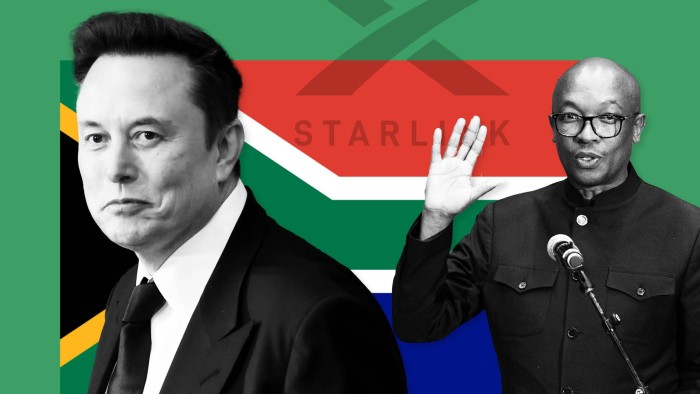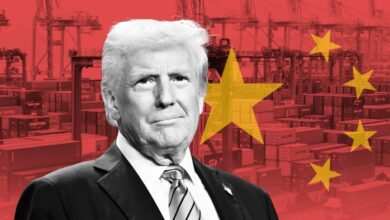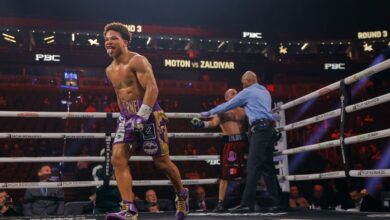Musk’s attacks on equality laws trigger dispute over Starlink in South Africa

Unlock the Editor’s Digest for free
Roula Khalaf, Editor of the FT, selects her favourite stories in this weekly newsletter.
Elon Musk’s hopes of launching Starlink in South Africa are being delayed by fierce infighting within the country’s ruling coalition over Black economic empowerment laws the US entrepreneur has characterised as “racist”.
Foreign investors in South Africa’s telecommunications sector are required to provide 30 per cent of the equity in a project to Black-owned businesses to qualify for a licence, a policy championed by the African National Congress to redress racial inequalities created under apartheid.
But Musk, who was born in South Africa, on Monday described the country’s policies as “openly racist”. US President Donald Trump also weighed in this weekend, saying South Africa’s government was “treating certain classes of people very badly”, a reference to a land expropriation bill also intended to address unequal ownership.
South African officials say Musk has expressed strong interest in launching Starlink’s broadband-by-satellite service in the country. The billionaire in September said he was “still waiting for regulatory approval” from Pretoria after launching in neighbouring nations including Botswana, Mozambique and Zimbabwe.
Starlink could become a test case of how far the ANC is prepared to dilute equality laws to attract investment and whether the pro-business Democratic Alliance — a key member of South Africa’s fragile government of national unity — is prepared to risk the stability of the coalition by pushing its opposition to Black empowerment.
Solly Malatsi, minister of communications and digital technology and deputy chair of the DA, has raised the possibility of giving Starlink, operated by Musk’s SpaceX, a carve-out from empowerment rules.
Malatsi told the Financial Times it might be possible to extend to the telecoms sector exceptions to ownership rules — known as “equity equivalent programmes” — offered to other sectors, including automobiles.
“I recognise the opportunity that equity equivalence programmes in the [telecoms] sector can help in expanding broadband connectivity to the quarter of our population which does not have access to the internet, while grappling with the reality that the current legislation doesn’t cover for that,” he said.
But ANC stalwarts are likely to oppose any attempt to water down Black empowerment rules. One person in government told the FT on Monday the party is divided on the Starlink issue — even more so after Musk’s latest intervention.
“The reformists would agree that an exception for Starlink is necessary, while the hardliners see any dilution of the rules as an attack on its quest for racial empowerment,” the person said. “But this is complicated because Musk’s posture towards South Africa this week also makes many in the ANC very uncomfortable.”
Malatsi’s predecessor as minister, the ANC’s Mondli Gungubele, was explicit two years ago that, if Starlink were to operate in South Africa, it would need to comply with the “prevailing legislation” on Black empowerment.
Parks Tau, minister of trade, industry and competition and an ANC member, in January appeared to double down on Black-empowerment rules by proposing a new R100bn ($5.3bn) “transformation fund” to invest exclusively in Black-owned businesses. Foreign investors would have to pay up to 25 per cent of the value of their operations into the fund.
Tau called the fund a “catalyst for change”, but the DA condemned the proposal, saying it would “not support this madness”. The DA’s chair, Helen Zille, has called the policies “a figleaf for corruption”.
President Cyril Ramaphosa, who met Musk to discuss possible investments by SpaceX and Tesla on the fringes of the UN general assembly meetings in New York last September, said he had told the US entrepreneur: “I want you to come home and invest here.”
One person familiar with the tug of war within the ruling coalition noted Ramaphosa invited the ANC’s Tau to the September meeting, but not the DA’s Malatsi. “Nobody knows what was discussed in that meeting,” the person said. “There was no internal brief, no steer from the president that any commitment was made.”
The BEE Chamber, a South African consultancy normally supportive of Black empowerment initiatives, described Tau’s R100bn transformation fund as being “to investment what mosquito repellent is to mosquitoes”.
One senior DA official told the FT: “The ANC appears intent on doubling down on what they refer to as the third wave of black empowerment, even at the cost of growth.” South Africa’s economy has not grown at all in per capita terms in 15 years.
“This is one of the most perverse effects of broad-based Black economic empowerment, which is not broad based and which doesn’t empower a lot of people,” he said.
Starlink, which is the main revenue driver for Musk’s SpaceX, has also faced a political backlash in Canada, where the premier of Ontario on Monday said he would rip up a $100mn contract with the company in retaliation against US tariffs.
SpaceX did not respond to a request for comment.
Additional reporting by Joe Miller from Washington





